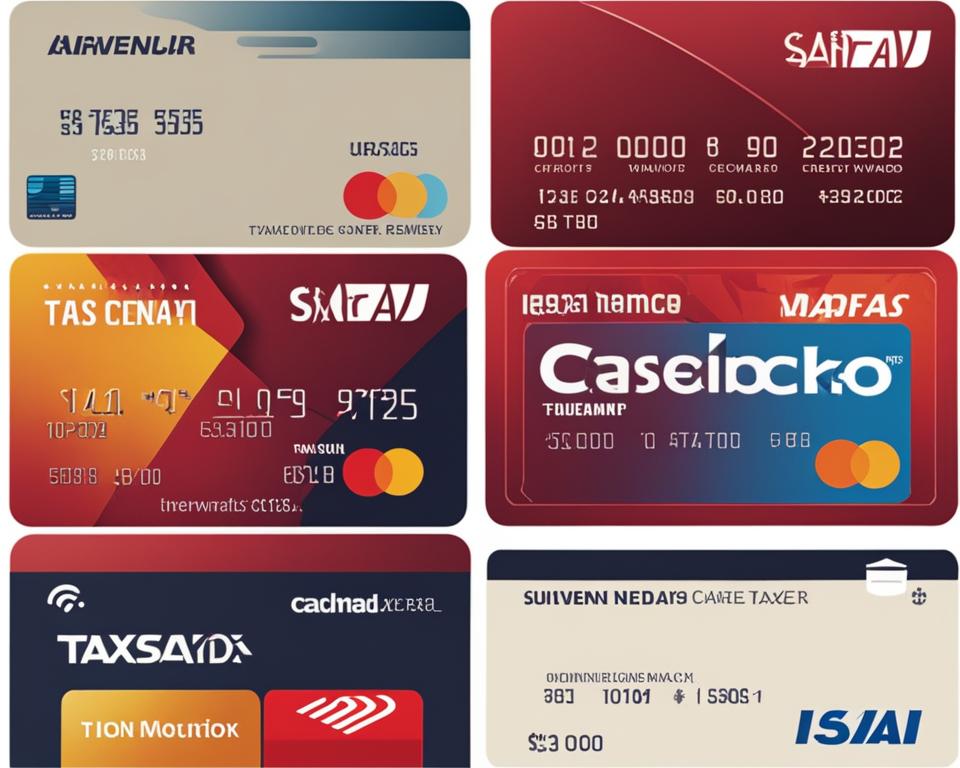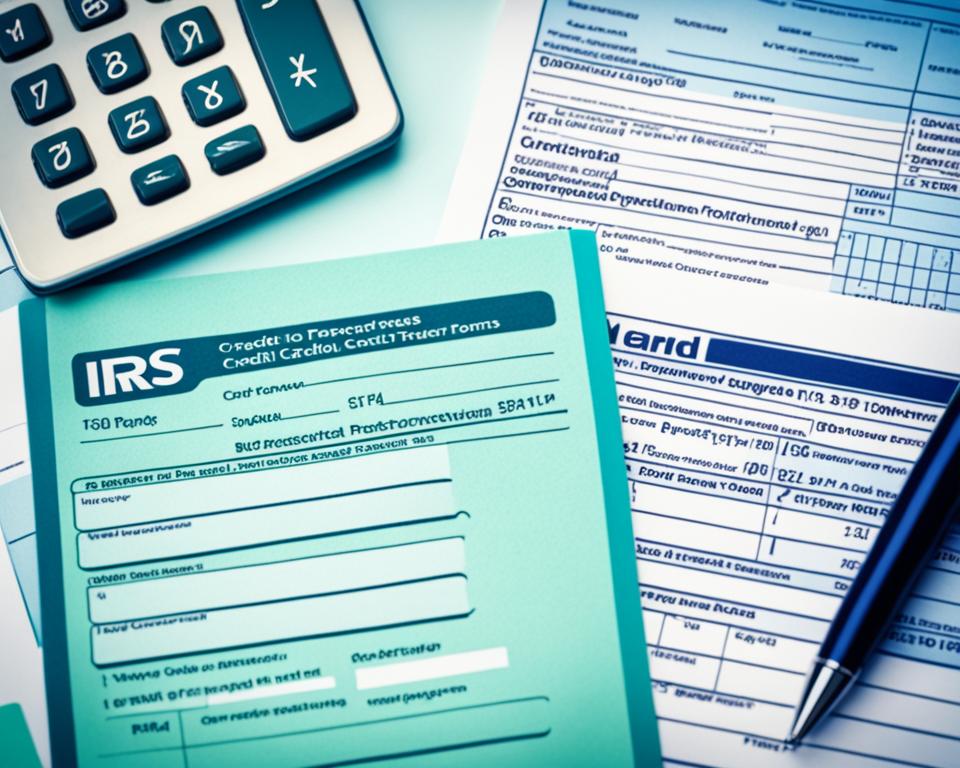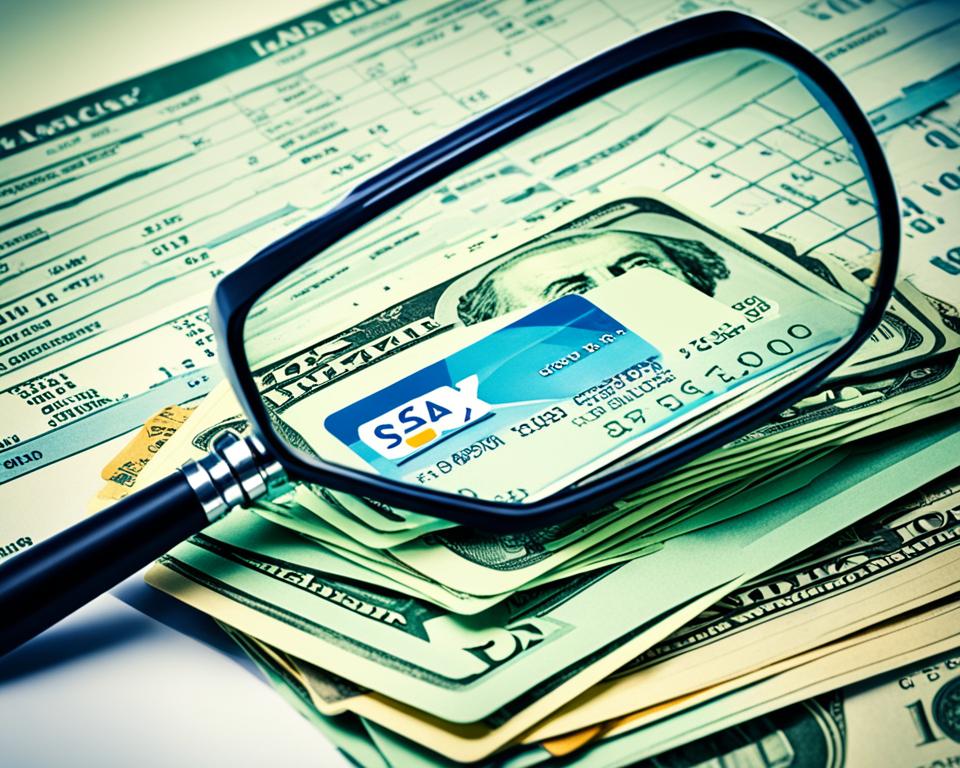When it comes to credit card rewards, many people wonder whether they are taxable. Understanding the tax implications of credit card rewards is essential to ensure compliance with IRS rules. While most credit card rewards do not need to be reported to the IRS and are not taxable, there are some cases where taxes may apply. It’s crucial to know the types of credit card rewards and how they are treated for tax purposes.
Image:
Key Takeaways:
- Most credit card rewards are not taxable and do not need to be reported to the IRS.
- Cash back, points, and miles are common types of credit card rewards.
- Certain rewards, such as bank account signup bonuses and refer-a-friend bonuses, may be considered taxable income.
- It’s crucial to consult a tax professional if you are unsure about the tax treatment of your credit card rewards.
- Paying taxes with a credit card to earn rewards may not always be beneficial due to associated fees.
Types of Credit Card Rewards
Credit card rewards can come in various forms, including cash back, points, and miles. Each type has its own benefits and considerations. Understanding the different types of credit card rewards can help you make informed decisions about which cards to use and how to maximize your rewards.
Cash Back Rewards
Cash back rewards are one of the most popular types of credit card rewards. When you make purchases using a cash back credit card, you earn a percentage of your spending back in the form of cash rewards. These rewards are usually credited to your account or sent to you as a check or statement credit.
The great thing about cash back rewards is that they are treated as rebates on your spending, not as taxable income. This means you don’t have to worry about reporting them to the IRS or paying taxes on them.
Points Rewards
Points rewards are another common type of credit card rewards. When you make purchases using a points credit card, you earn points that can be redeemed for a variety of rewards, such as gift cards, travel vouchers, or merchandise.
Similar to cash back rewards, points earned from credit card spending are generally not taxable. They are considered to be a form of rebate or discount on your purchases.
Miles Rewards
Miles rewards are often associated with travel credit cards. When you make purchases using a miles credit card, you earn miles that can be used to book flights, hotel stays, or other travel-related expenses.
Like cash back and points rewards, miles earned from credit card spending are typically not considered taxable income. They are seen as a form of reward for your loyalty and spending, rather than as taxable earnings.
It’s important to note that the tax treatment of credit card rewards may vary depending on your individual circumstances and the specific terms and conditions of your credit card issuer. Always consult with a tax professional or refer to IRS guidelines to ensure compliance with tax regulations.
“Cash back, points, and miles are all popular types of credit card rewards that can help you save money or earn valuable travel benefits. Understanding the differences between these rewards can help you choose the right credit card for your needs and maximize your overall benefits.” – Credit Card Expert
Rewards That Are Considered Income
Certain types of credit card rewards are considered income and may be subject to taxation. It’s important to understand which rewards fall into this category to ensure compliance with IRS regulations and avoid any potential issues.
Bank Account Signup Bonuses
When you receive bank account signup bonuses in the form of rewards points or cash, they are considered interest income and may need to be reported on a 1099-INT form. These bonuses are often offered by banks as an incentive to attract new customers or encourage existing customers to open additional accounts.
Refer-a-Friend Bonuses
Refer-a-friend bonuses are another type of credit card reward that is considered income. These bonuses are typically earned when you refer someone to apply for a credit card and they are approved. As these bonuses are earned in exchange for performing a service (referring a customer), they are subject to taxation.
In both of these cases, if you receive a 1099-MISC form from the bank or credit card company reporting the value of the rewards, it is important to include this information when filing your taxes.

Understanding which credit card rewards are considered income is crucial for accurately reporting your earnings and fulfilling your tax obligations. Failure to report taxable rewards can result in penalties and additional taxes owed. If you are unsure about the tax implications of a specific reward, it is always recommended to consult with a tax professional.
Rewards That Are Not Considered Income
Most credit card rewards, including those earned from credit card purchases and welcome bonuses, are considered rebates or discounts on purchases and are not taxable. The same applies to miles earned from personal travel. These rewards are not considered income by the IRS and do not need to be reported on your tax return.
By using credit cards for everyday purchases or taking advantage of welcome bonuses, you can earn various rewards such as cash back, points, or miles. These rewards can add up quickly and provide significant value, allowing you to save money or enjoy rewards on travel and other expenses.
For example, let’s say Sarah has a cash back credit card that offers her 2% cash back on all purchases. In a year, she spends $10,000 on her credit card, earning $200 in cash back rewards in the process. Since these cash back rewards are considered rebates or discounts on her purchases, Sarah does not need to report them as income when filing her taxes.
Similarly, many credit cards also offer rewards in the form of points or miles. These rewards can be redeemed for travel expenses, such as flights, hotel stays, or car rentals. If you earn miles through personal travel activities, such as using a travel rewards credit card or participating in a hotel loyalty program, these miles are also not taxable.
“I love earning miles on my credit card and using them for free flights,” says David, a frequent traveler. “It’s great to know that I don’t have to worry about these miles being taxable. It’s like getting rewarded for something I love doing anyway!”
To summarize, credit card rewards earned from credit card purchases and welcome bonuses, as well as miles earned from personal travel, are not considered income by the IRS. Therefore, you do not need to report them on your tax return. Enjoy the benefits of your credit card rewards without the extra hassle of tax reporting.
| Rewards Type | Taxable? |
|---|---|
| Cash back | No |
| Points | No |
| Miles | No |
Do I Have to Report Credit Card Rewards on My Tax Returns?
When it comes to reporting credit card rewards on your tax return, the general rule is that you don’t have to report them. Most credit card rewards are considered rebates or discounts on purchases rather than taxable income. However, there are exceptions to this rule.
If your credit card rewards fall into the category of taxable income, you must report them on your tax return. It’s important to understand the specific circumstances under which your rewards may be considered taxable. To determine whether you need to report your rewards, you should take into account the type of rewards you received and how they were earned.
If you’re uncertain about whether you should report your credit card rewards or how to report them, it’s advisable to consult a tax professional. A tax professional can provide guidance based on your specific situation and ensure that you comply with IRS regulations.
Reporting credit card rewards accurately is crucial, as failure to report taxable rewards could result in penalties or interest charges if the IRS determines that you underreported your income. To avoid such issues, it’s best to seek professional advice and ensure that you handle your credit card rewards appropriately on your tax return.
Tax Implications for Credit Card Rewards
| Reward Type | Taxable | Non-Taxable |
|---|---|---|
| Cash Back | No | Yes |
| Points | Yes (in some cases) | No |
| Miles | Yes (in some cases) | No |
| Signup Bonuses | Yes (in some cases) | No |
It’s important to note that the taxability of credit card rewards can vary depending on specific circumstances. The table above provides a general overview, but it’s always best to consult a tax professional for precise guidance.
Do I Have to Declare Credit Card Cash Back on My Tax Returns?
Credit card cash back is a popular feature offered by many credit card issuers. It allows cardholders to earn a percentage of their purchases back in the form of cash rewards. But when it comes to tax season, you may wonder if you need to declare these cash back rewards on your tax returns.
The good news is that credit card cash back is typically treated as a rebate or discount on your purchases, rather than income. As such, there is no need to report credit card cash back on your tax returns. The Internal Revenue Service (IRS) does not consider it to be taxable income. Instead, the IRS views credit card cash back as a form of savings or a reduction in the amount you paid for your purchases.
In simple terms, cash back rewards from credit cards are not subject to income tax because they are not considered additional income. When you receive cash back, it is essentially a refund or a discount on what you spent. Since you didn’t earn any additional income, you do not need to declare it on your tax return.
However, it’s important to note that this treatment applies specifically to credit card cash back rewards. Other types of rewards, such as bank account signup bonuses or refer-a-friend bonuses, may be subject to different tax rules. These rewards may be considered income and may require reporting on your tax return. It’s important to consult the IRS guidelines or seek advice from a tax professional to accurately report any taxable rewards.
“Credit card cash back is not taxable income as it is considered a rebate or discount on your purchases. The IRS treats it as a form of savings rather than income.”

Table: Comparison of Tax Treatment for Different Types of Credit Card Rewards
| Reward Type | Tax Treatment |
|---|---|
| Credit Card Cash Back | Not taxable; considered a rebate or discount on purchases |
| Points and Miles | Generally not taxable when earned through personal travel |
| Bank Account Signup Bonuses | Considered interest income and may be reported on a 1099-INT form |
| Refer-a-Friend Bonuses | Considered income and may require reporting on a 1099-MISC form |
Are Business Credit Card Rewards Taxable?
Business credit card rewards can have tax implications for small businesses. While the rewards themselves are not directly taxable, they may affect the amount that can be deducted as a business expense. When purchasing items for business purposes, any rewards earned should be deducted from the overall cost of the item for tax purposes.
By deducting the value of the rewards, businesses can reduce their taxable income and potentially lower their tax liability. This deduction applies to both cash back rewards and rewards earned in the form of points or miles.
It’s important for small businesses to keep accurate records of their credit card rewards and how they are used for business expenses. This documentation will be helpful in case of an audit or if the IRS requests further information.
| Benefits | Tax Implications |
|---|---|
| Lower Business Expenses: | If a small business is able to deduct the value of credit card rewards from the cost of business expenses, it can help reduce the overall expenses and potentially increase profits. This deduction can be particularly beneficial for businesses with significant credit card usage. |
| Increased Cash Flow: | By reducing business expenses through the deduction of credit card rewards, small businesses can free up more cash flow, which can be reinvested into the business or used for other purposes. |
| Enhanced Rewards Earnings: | Knowing the tax implications of business credit card rewards allows small businesses to strategically choose credit cards that offer the most valuable rewards for their specific needs. |
It’s important for small business owners to consult with a tax professional to ensure they are accurately reporting and deducting their credit card rewards for business expenses. This will help minimize the risk of errors or audits and ensure compliance with IRS regulations.
How Are Credit Card Rewards Taxed?
The taxation of credit card rewards depends on various factors, including the type of rewards and how they are earned. In most cases, credit card rewards are not taxable as they are considered rebates or discounts on purchases. However, certain types of rewards may be subject to taxation.
Here’s a breakdown of the tax treatment of different credit card rewards:
Cash Back Rewards:
Cash back rewards are typically not taxable because they are considered a form of discount or rebate on your purchases. The IRS views cash back as a reduction in the overall cost of your qualifying expenses rather than income. As a result, you do not have to report cash back rewards on your tax return.
Travel Rewards:
Rewards in the form of points or miles earned from travel are generally not taxable. These rewards are often considered a benefit or discount on your travel expenses rather than income. As a result, you do not have to report points or miles earned from personal travel on your tax return.
Sign-Up Bonuses:
Sign-up bonuses that require you to meet spending requirements are typically treated as discounts on your purchases and are not taxable. However, bear in mind that some credit card companies offer sign-up bonuses with no spending requirements. In such cases, the bonus may be considered taxable income. Check the terms and conditions of your credit card agreement or consult a tax professional to determine if your sign-up bonus is taxable.
Refer-a-Friend Bonuses:
Refer-a-friend bonuses may be subject to taxation as they are earned in exchange for performing a service. If you receive a refer-a-friend bonus, it’s important to report it as income on your tax return. The credit card company may issue a 1099-MISC form to report the value of the bonus.
It’s important to understand the specific tax treatment of the credit card rewards you earn. If you have any questions or concerns about the taxation of your rewards, consult a tax professional for guidance based on your individual circumstances.

How Can I Avoid Paying Taxes on Credit Card Rewards?
While it’s not possible to completely avoid paying taxes on credit card rewards that are considered taxable income, there are strategies you can implement to minimize your tax liability. By engaging in thoughtful tax planning and staying organized, you can ensure that you are appropriately tracking and reporting your rewards to the IRS. Here are some tips to consider:
- Keep accurate records: Maintain detailed records of your credit card transactions, including the rewards you earn. This will help you accurately determine if any of your rewards are taxable and ensure that you report them correctly.
- Consult a tax professional: Working with a tax professional who specializes in credit card rewards and tax planning can provide valuable guidance. They can help you understand the specific tax implications of your rewards and ensure that you are compliant with IRS regulations.
- Offset taxable rewards with deductions: If you have business expenses that can be deducted, consider using your credit card rewards to offset those expenses. This can help lower your overall taxable income and potentially reduce your tax liability.
- Maximize non-taxable rewards: Focus on earning credit card rewards that are not considered taxable income, such as cash back or miles earned from personal travel. By maximizing these non-taxable rewards, you can enjoy the benefits without worrying about additional tax obligations.
- Stay informed: Keep yourself updated on any changes in IRS rules regarding credit card rewards. Tax laws can change, so it’s important to stay informed to ensure compliance and make informed decisions.
While it’s essential to explore ways to minimize your tax liability, it’s crucial to do so within the boundaries of the law. Engaging in fraudulent activities or intentionally evading taxes can result in severe penalties and legal consequences. By following the appropriate tax planning strategies and seeking professional advice when needed, you can navigate the tax implications of credit card rewards effectively.
Can I Pay Taxes With a Credit Card to Earn Rewards?
While paying taxes with a credit card may seem like a convenient way to earn rewards, it’s important to consider the associated fees before making this decision. In most cases, the fees charged by the IRS-approved third-party processor outweigh the value of the rewards earned, or even result in a net loss.
Before choosing to pay taxes with a credit card, it’s crucial to carefully calculate whether the potential rewards outweigh the costs. Here are some factors to consider:
- The credit card processing fees: When you pay taxes with a credit card, the IRS-approved third-party processor charges a fee for processing the transaction, which is usually a percentage of the tax payment. This fee can range from 1.87% to 1.99% of the amount paid.
- The credit card rewards: Determine the value of the rewards you would earn by using your credit card to pay taxes. Calculate the percentage or cash value of the rewards you would get based on your card’s rewards program.
- The net benefit: Subtract the credit card processing fees from the value of the rewards earned to determine the net benefit of paying taxes with a credit card. If the net benefit is negative or negligible, it may be more cost-effective to explore alternative payment methods.
Keep in mind that the fees associated with paying taxes with a credit card may vary depending on the payment processor and the specific credit card used. It’s essential to review the terms and conditions of your credit card and contact the payment processor to understand the exact fees involved.
If the rewards outweigh the costs and you decide to pay taxes with a credit card, it’s important to track the transaction and keep records for tax purposes. You will need to report the credit card payment on your tax return and retain documentation of the transaction in case of any inquiries from the IRS.
Before making any decisions related to paying taxes with a credit card, it’s recommended to consult with a tax professional who can provide personalized advice based on your specific financial situation.
| Credit Card Processing Fees | Credit Card Rewards | Net Benefit |
|---|---|---|
| 1.87% – 1.99% of tax payment | Varies based on credit card rewards program | Net benefit = Rewards – Fees |
How to Report Credit Card Rewards on Taxes
If you have taxable credit card rewards, it is important to properly report them on your tax return. The Internal Revenue Service (IRS) requires individuals to report income from credit card rewards that are considered taxable. By following the necessary steps and guidelines, you can ensure compliance with IRS regulations and avoid any potential issues.
To report your credit card rewards on your tax return, you will typically need to fill out the appropriate IRS forms. One common form used for reporting taxable income, including credit card rewards, is the 1099-MISC form. This form is used to report miscellaneous income, such as earnings from freelance work or side gigs. If you have received a form indicating the value of your rewards, be sure to include this information on your tax return.
When reporting your credit card rewards, it is essential to accurately input the information on the designated forms. Any discrepancies or omissions may result in IRS penalties or audits. It is advisable to consult a tax professional who can provide guidance specific to your situation and ensure that you are reporting your rewards correctly.
It is worth noting that not all credit card rewards are taxable. Most rewards, such as cash back or points earned through regular spending, are generally considered rebates or discounts on purchases and are not subject to taxation. However, it is crucial to understand the specific tax treatment of the rewards you have earned and refer to the IRS guidelines for reporting requirements.
Here is an example of how the reporting process might look:
| IRS Form | Required Information |
|---|---|
| Form 1099-MISC | Value of taxable credit card rewards |
| Form 1040 | Include rewards as part of your overall income |

Reporting your credit card rewards on your tax return ensures that you fulfill your legal obligations and provides an accurate reflection of your income for the year. By understanding the appropriate forms and consulting a tax professional when needed, you can navigate the reporting process with confidence.
FAQs on Credit Card Rewards and Taxes
Here are some frequently asked questions about credit card rewards and taxes:
- Are all credit card rewards taxable?
Most credit card rewards are not taxable, as they are considered rebates or discounts on purchases. However, there are some cases where certain types of rewards may be considered taxable income. It’s important to understand the specific tax treatment of the rewards you earn.
- What types of credit card rewards are taxable?
Certain types of credit card rewards, such as bank account signup bonuses received as rewards points or cash, may be considered taxable income. Refer-a-friend bonuses are also considered income. It’s advisable to consult a tax professional to determine if your specific rewards are taxable.
- Do I need to report my credit card rewards on my tax return?
For most credit card rewards, you do not need to report them on your tax return. However, if your rewards are considered taxable income, you must report them on the appropriate IRS forms.
- How do I report taxable credit card rewards on my tax return?
If you have taxable credit card rewards, you will need to report them on your tax return. This typically involves reporting the income on the appropriate IRS forms, such as the 1099-MISC form. It’s important to consult a tax professional or refer to IRS guidelines for specific reporting requirements.
- Can I avoid paying taxes on credit card rewards?
There are no specific ways to avoid paying taxes on credit card rewards that are considered taxable income. However, you can minimize your tax liability by carefully tracking and reporting your rewards. Consult a tax professional for guidance on how to report and minimize your tax liability.
Remember to consult a tax professional for personalized advice regarding your specific situation.
Taxability of Credit Card Rewards
| Type of Credit Card Reward | Taxability |
|---|---|
| Cash back rewards | Not taxable |
| Points earned from credit card purchases | Not taxable |
| Miles earned from personal travel | Not taxable |
| Bank account signup bonuses | Taxable as interest income |
| Refer-a-friend bonuses | Taxable as earned income |
Note: This table provides a general overview and may not cover all scenarios. Consult a tax professional for personalized advice.
Conclusion
In conclusion, credit card rewards are a popular benefit for cardholders, providing them with incentives for their spending. In most cases, these rewards are not taxable and are considered rebates or discounts on purchases. This means that you don’t have to report them as income on your tax returns.
However, it’s important to note that there are exceptions to this rule. Some credit card rewards, such as bank account signup bonuses and refer-a-friend bonuses, may be considered taxable income and require reporting. These rewards are usually reported on specific IRS forms, such as the 1099-MISC form.
To navigate the complex world of credit card rewards taxation, it’s advisable to consult a tax professional. They can provide guidance based on your specific situation and help you understand the tax treatment of the rewards you earn. By carefully tracking and reporting your rewards, you can ensure compliance with IRS regulations and minimize your tax liability.
Remember, understanding the tax implications of credit card rewards is essential for accurate tax reporting. Stay informed, consult a tax professional if needed, and enjoy the benefits of your credit card rewards without any surprises come tax season.
FAQ
Are credit card rewards taxable?
Most credit card rewards are not taxable. Cash back rewards, points, and miles earned from personal travel are generally considered rebates or discounts on purchases and do not need to be reported as taxable income.
What types of credit card rewards are there?
Credit card rewards can come in the form of cash back, points, or miles. Cash back rewards provide a percentage of your spending back to you as a rebate. Points and miles can be redeemed for various rewards, such as travel, merchandise, or gift cards.
When are credit card rewards considered income?
Some credit card rewards, such as bank account signup bonuses and refer-a-friend bonuses, are considered income and may be taxable. These rewards are typically reported on IRS forms, such as the 1099-MISC form, and should be included in your tax return.
Are there credit card rewards that are not considered income?
Yes, most credit card rewards, including those earned from credit card purchases and welcome bonuses, are not considered income by the IRS. These rewards are treated as rebates or discounts on purchases and are not taxable.
Do I have to report credit card rewards on my tax returns?
Generally, you do not need to report credit card rewards on your tax returns. However, if you receive taxable rewards, they should be reported as income on the appropriate IRS forms, such as the 1099-MISC form. It’s advisable to consult a tax professional if you have any questions or concerns.
Do I have to declare credit card cash back on my tax returns?
No, you do not have to declare credit card cash back on your tax returns. The IRS considers cash back to be a form of savings rather than taxable income.
Are business credit card rewards taxable?
Business credit card rewards may have tax implications for small businesses. While the rewards themselves are not directly taxable, they may affect the amount that can be deducted as a business expense. It’s important to consult a tax professional for guidance on the tax treatment of business credit card rewards.
How are credit card rewards taxed?
Most credit card rewards are not taxable and are considered rebates or discounts on purchases. However, certain rewards that are considered income may be subject to taxation. The tax treatment of credit card rewards depends on various factors, such as the type of rewards and how they are earned.
How can I avoid paying taxes on credit card rewards?
There are no specific ways to avoid paying taxes on credit card rewards that are considered taxable income. However, you can minimize your tax liability by carefully tracking and reporting your rewards. It’s recommended to consult a tax professional for guidance on how to report and minimize your tax liability on taxable rewards.
Can I pay taxes with a credit card to earn rewards?
It is possible to pay taxes with a credit card, but there are fees associated with this option. These fees can often negate the value of any rewards earned or even result in a net loss. It’s important to consider the fees involved and calculate whether the rewards outweigh the costs before choosing to pay taxes with a credit card.
How do I report credit card rewards on my taxes?
If you have taxable credit card rewards, you will need to report them on your tax return. This typically involves reporting the income on the appropriate IRS forms, such as the 1099-MISC form. It’s essential to review the IRS guidelines and consult a tax professional for guidance on how to report your specific rewards.
What are some frequently asked questions about credit card rewards and taxes?
Some commonly asked questions include whether credit card rewards are taxable, how to report credit card rewards on tax returns, and whether business credit card rewards are taxable. It’s important to understand the tax implications of credit card rewards and consult a tax professional for personalized advice.





